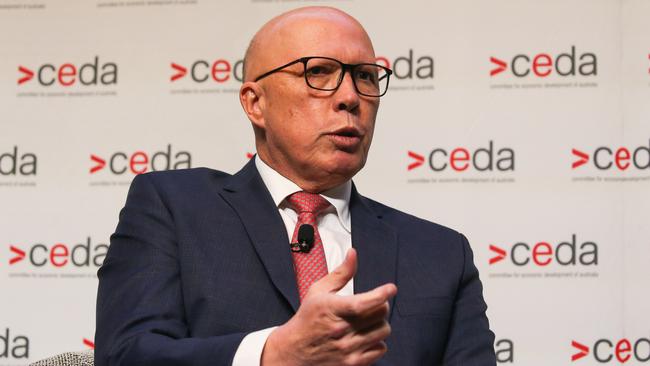Peter Dutton says if nuclear plan can gain bipartisanship, deals with states could be clinched ‘quickly’
Peter Dutton is holding out the prospect of gaining bipartisanship from Labor and stakeholders on his controversial nuclear plan.

Peter Dutton is holding out the prospect of gaining bipartisanship from Labor and stakeholders on his controversial nuclear plan and says a future Coalition government could strike deals with South Australia and other states to introduce the technology “very quickly”.
In an address attacked by the Albanese government for containing “the same old lies and misinformation”, the Opposition Leader said the establishment of nuclear power plants wasn’t possible before the AUKUS nuclear-powered submarine pact won Labor’s support but now that hurdle had been crossed, a domestic nuclear industry was more likely.
“Labor gave up any pretence of being concerned about safety when they signed up to AUKUS. And it was a difficult debate before that … The government has accepted that it is a safe technology and that disposal is possible in our country,” Mr Dutton said at a Committee for Economic Development Australia lunch.
“As an island nation, we’re not able to rely on others (for nuclear) as we know can happen in Europe. So I think we have to make the step. We’re better off to make it sooner than later. I think it can happen on a bipartisan position.
“I do think it’s transformational for our economy and I think if the Prime Minister can get past the weakness of the current approach and dispense with the short-termism around the political opportunity domestically, then I think there is a coming together opportunity.”
Pointing to support for nuclear from within Labor’s ranks, including from SA Premier Peter Malinauskas, Mr Dutton said he would work in collaboration with state leaders to determine what level of nuclear investment was required.
“Even here in NSW, I think Premier (Chris) Minns is pragmatic and sensible in relation to a number of policy debates that he’s involved in at the moment, I think there is an arrangement that can be struck very quickly with state governments who I think are pragmatic,” the Liberal leader said.
“With South Australia, we could strike a deal very quickly. The only reservation Peter Malinauskas has expressed about nuclear is in relation to cost, and I believe that we can deal with those concerns in due course.”
Under pressure to release the cost of his proposed nuclear rollout, Mr Dutton vowed it would be independently verified and “show a cost differential which is significant in favour of nuclear coming into the mix”.
“We want to make sure that we roll that plan out in a responsible way with support from stakeholders and we need people to join this debate,” he said.
Climate Change and Energy Minister Chris Bowen said Mr Dutton was treating Australians “arrogantly, with contempt” by not providing more details of his energy plan, and lashed a “new claim that somehow nuclear energy has lower running costs than solar and renewables, which is wrong”.
“Peter Dutton had an opportunity today, indeed an obligation in his big speech about nuclear energy, to provide the Australian people with costings, facts, modelling and with details about his nuclear scheme. He failed on every single metric,” Mr Bowen said.
Former competition watchdog chair Rod Sims, who now heads the Superpower Institute, said the cost of nuclear power had been stable or increasing for years while the cost of solar and wind had “massively” declined.
“Nuclear is now considerably more expensive than renewable energy for those countries with access to good renewable resources. We should plan for these trends to continue,” Mr Sims said.
“Mr Dutton’s speech pointed to examples of nuclear power in other countries. These countries often invested some time ago and simply lack the abundant, high-quality renewable resources Australia has.”




To join the conversation, please log in. Don't have an account? Register
Join the conversation, you are commenting as Logout